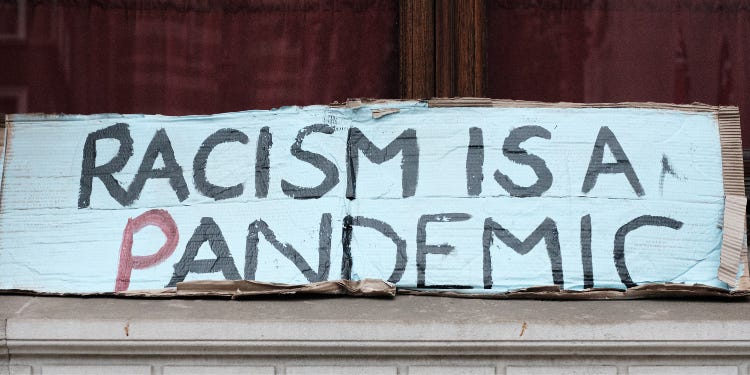Genocide in America -- and Other Idiotic Observations
The death of George Floyd in Minneapolis a few months ago touched off a cultural revolution in America, one replete with protests in the streets along with more than a little rioting and looting.
The narrow message was that there’s a wave of police brutality washing over the country and it’s got to stop. The bigger message is that it’s not just bad cops who are the problem, but that America in its entirety is the problem. Not that there are racists in America, but that racism is “systemic,” meaning it permeates every facet of American life.
Naomi Osaka, the tennis superstar took to twitter to tell us that, “Watching the continued genocide of Black people at the hand of the police is honestly making me sick to my stomach."
Genocide? Here in the United States? Really? Perhaps Ms. Osaka doesn’t know the meaning of the word -- that it refers to “the deliberate killing of a large group of people, especially those of a particular ethnic group or nation.”
But let’s not be too harsh on Ms. Osaka. After all she’s only 22 and spent a good deal of her life hitting a ball with a racquet over a net.
But what should we make of the scholars who keep telling us that “systemic racism” in our country is real and that it can’t be tolerated any longer?
There’s Ted Ruger, dean of the University of Pennsylvania law school who says, “We are again reminded that this country’s 400-year history of racism continues to produce clear and present danger to the bodies and lives of Black people in every part of the United States.”
And there’s Amherst College president Carolyn Martin who says that the “virulent anti-black racism in this country has never NOT been obvious, and yet there are those who continue to deny it,” before making a plea “to white people in particular, to acknowledge the reality of anti-black racism, its long history, and its current force; to recognize how embedded it is in our institutional structures, social systems, and cultural norms; and to assume our responsibility for ending it.”
And there’s UCLA chancellor Gene Block who believes that “racism permeates every sector of our society, from education to employment, from housing to health care, from board rooms to court rooms.”
There are many, many more scholars who say things just like that, but you get the idea. What’s especially noteworthy is that it turns out that liberal elite college campuses are a hotbed of this horrible racism.
Princeton University President Christopher Eisgruber, for example, says that, “Racism and the damage it does to people of color persist at Princeton … and racist assumptions . . . remain embedded in structures of the University itself.”
At Middlebury College in Vermont, the school’s president, Laurie Patton, tells us that racism “happens in our residence halls and in our classrooms, at the tables of our dining halls and in our locker rooms, on our sidewalks, within the offices where we work, and in our town.”
But as Heather MacDonald writes in the Manhattan Institute’s magazine, City Journal, “All such institutional self-accusations by college presidents leave out the specifics. Which faculty members do not treat black students fairly? If that unjust treatment is so obvious, why weren’t those professors already removed? What is wrong with an admissions process that lets in thousands of student bigots? In other moments, college presidents brag about the quality of their student body and faculty. Are they lying? Shouldn’t they have disclosed to black applicants that they will face ‘racist acts’ and ‘systems of inequality’ should they attend?”
But, despite the lectures we get from scholars, and despite what we hear from athletes like Naomi Osaka, systemic racism isn’t automatically a fact just because they say it is. “Other credible explanations exist for ongoing racial disparities, including family structure, cultural attitudes, and individual behavior. To declare from the highest reaches of the academy that racism is the defining and all-explaining feature of American society is to adopt a political position, not to state a scientific truth,” as Heather MacDonald nicely sums it up.
There is a reason, of course, that we hear so much about the evils of system racism from so many white liberals. It’s because there are no limits to white liberal guilt, a condition that is, well, systemic among those on the left.
Many white liberals see racism everywhere – remember, that’s what “systemic racism” means, that it’s everywhere – because they have a desperate need to show off what the black conservative scholar Shelby Steele calls, their “good racial manners,” to show the world that they’re the “good ones.”
But, as Heather MacDonald, asks, “What if the racism explanation for ongoing disparities is wrong, however? What if racial economic and incarceration gaps cannot close without addressing personal responsibility and family culture—without a sea change in the attitudes that many inner-city black children bring with them to school regarding studying, paying attention in class, and respecting teachers, for example?”
Such a discussion is a dangerous one to have in places like liberal American universities or American newsrooms or chic Manhattan dinner parties. Anyone who dares bring up such inconvenient alternatives to “systemic racism” runs the risk of being called a racist – if he or she is lucky. If they’re not lucky, they’ll simply be cancelled.
And the very real problems plaguing too much of black America will persist. But hey, all those white liberals will feel better – about themselves. And that's what's really important.



